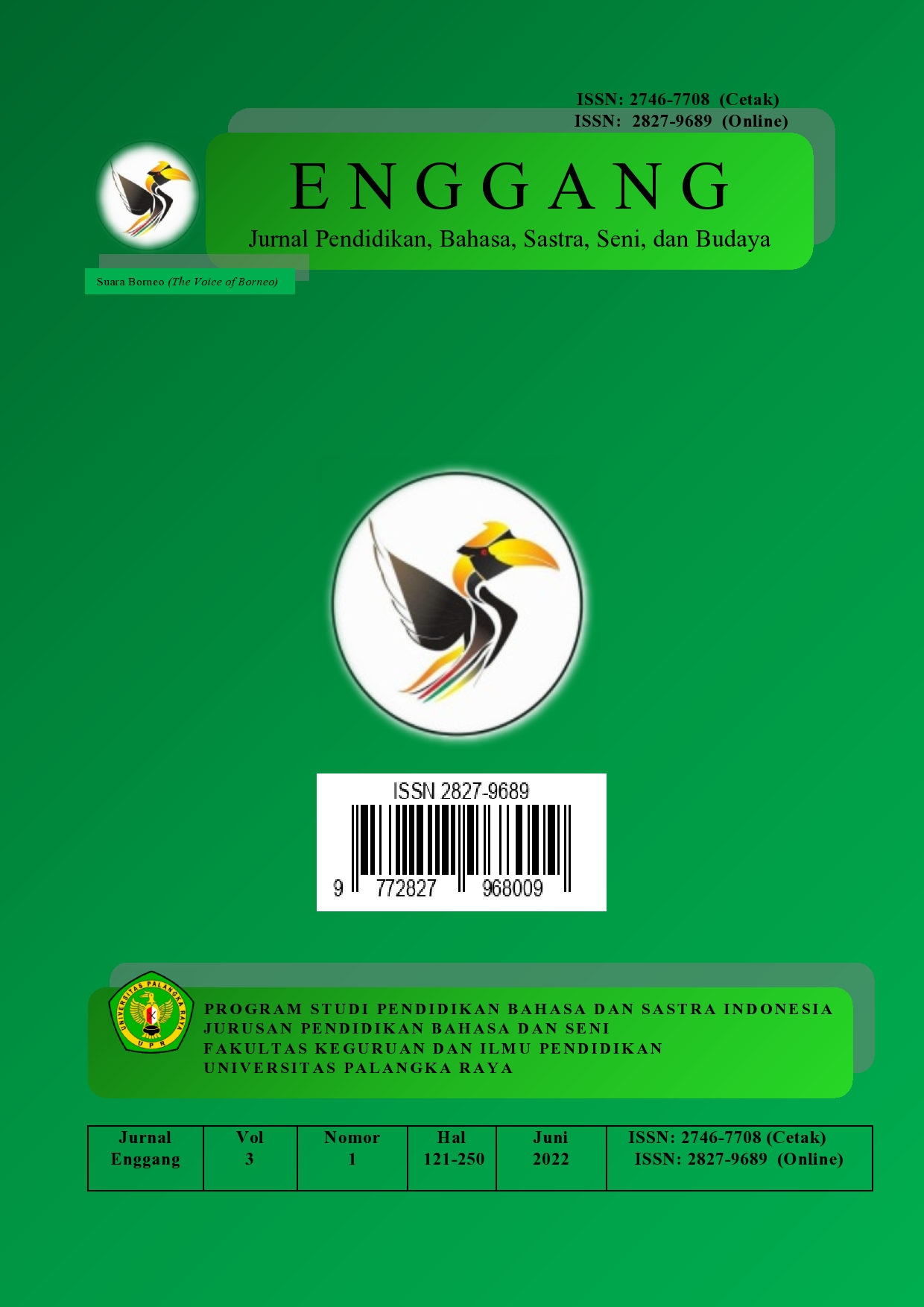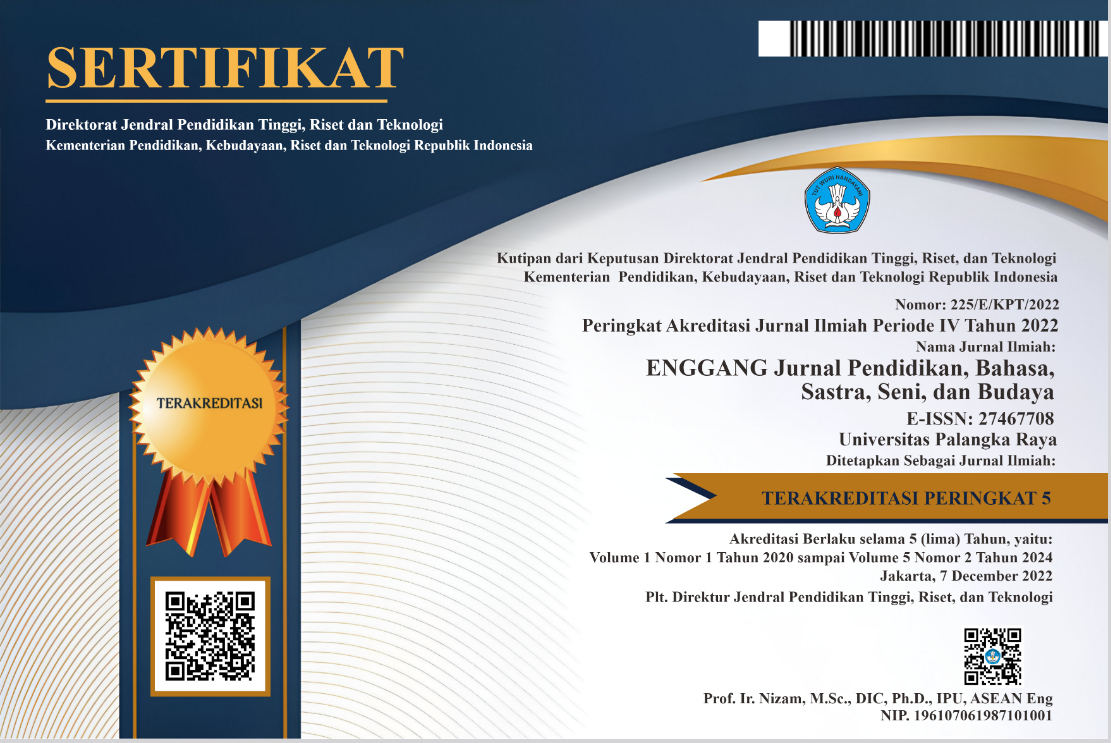PAMALI PADA PEREMPUAN HAMIL DI MASYARAKAT BANJAR KALIMANTAN SELATAN (KAJIAN ANTROPOLOGI SASTRA)
DOI:
https://doi.org/10.37304/enggang.v3i2.10042Keywords:
Pamali to pregnant women, literary anthropologyAbstract
Pamali to pregnant women in the Banjar community of South Kalimantan is a type of oral tradition whose existence still exists today. Pamali is a prohibition/taboo that regulates the behavior, speech, and lifestyle of a pregnant woman in society. The sentence 'pamali' has an accompanying 'effect' if the offender breaks it. Based on this, pamali in pregnant women is studied from the perspective of literary anthropology. This type of research is qualitative-description which aims to describe the forms and aspects of literary anthropology in this Pamali. From the results of the research, it was found that 15 pamali were grouped into 4 forms based on aspects of habit, manners, unseen things and types of food. Most of these pamali are analogies of certain objects with the body parts of a pregnant woman and the baby she is carrying. So, many Banjar people still believe in this pamali-pamali to avoid bad things during pregnancy.
Downloads
References
Juwati. (2018). Sastra Lisan Bumi Silampari: Teori, Metode, dan Penerapannya. Yogyakarta: Penerbit Deepublisher.
Kasron. (2018). Anatomi Fisiologi dan Gangguan Pencernaan. Jakarta: TIM Media Grup.
Masykur. (2018). Berguru Adab Kepada Imam Malik. Sukabumi: CV Jejak.
Misnawati, M. (2022). Teori Ekopuitika untuk Penelitian Sastra Lisan. Drestanta Pelita Indonesia Press.
Misnawati, M., Poerwadi, P., Nurachmana, A., Veniaty, S., Lestariningtyas, S. R., Christy, N. A., ... & Rahmawati, S. (2022). The Ekopuitika Theory. International Journal of Education and Literature, 1(1), 54-62.
Moleong, L. J. (2004). Metodologi Penelitian Kualitatif. Bandung: PT. Remaja Rosdakarya.
Reber, A. S. (2010). The Penguin Dictionary of Pshycology. (Y. Santoso, Trans.) Yogyakarta: Pustaka Pelajar.
Rokhmansyah, A. (2014). Studi dan Pengkajian Sastra; Perkenalan Awal terhadap Ilmu Sastra. Yogyakarta: Graha Ilmu.
Rukajat, A. (2018). Pendekatan Penelitian Kualitatif (Qualitative Research Approach). Yogyakarta: Penerbit Deepublisher.
Santiani, S., Poerwadi, P., Misnawati, M., Supriyati, S., & Maya, S. (2022, May). Unsur Mistis Dalam Novel-Novel Karya Neno Cristiandi Nelis dan Implikasinya pada Pembelajaran di SMA (Tinjauan Antropologi Sastra). In PROSIDING SEMINAR NASIONAL PENDIDIKAN, BAHASA, SASTRA, SENI, DAN BUDAYA (Vol. 1, No. 1, pp. 106-123).
Sedyawati, E. (2014). Kebudayaan di Nusantara: Dari Keris, Tor-Tor sampai Industri Budaya. Depok: Komunitas Bambu.
Soma, S. (2010). Pengantar Ilmu Teknik Lingkungan Seri: Pengelolaan Sampah Lingkungan. Bogor: IPB Press.
Sulaeman, A. (2015, Oktober 27). Tribun News. Retrieved from Gelang Buyu, Oleh-oleh Khas Kalimantan Selatan yang dibuat dari Tulang Hiu Sebagai Pengusir.
Widi, R. K. (2018). Asas Metodologi Penelitian: Sebuah Pengenalan dan Penuntun Langkah demi Langkah. Yogyakarta: Graha Ilmu.













